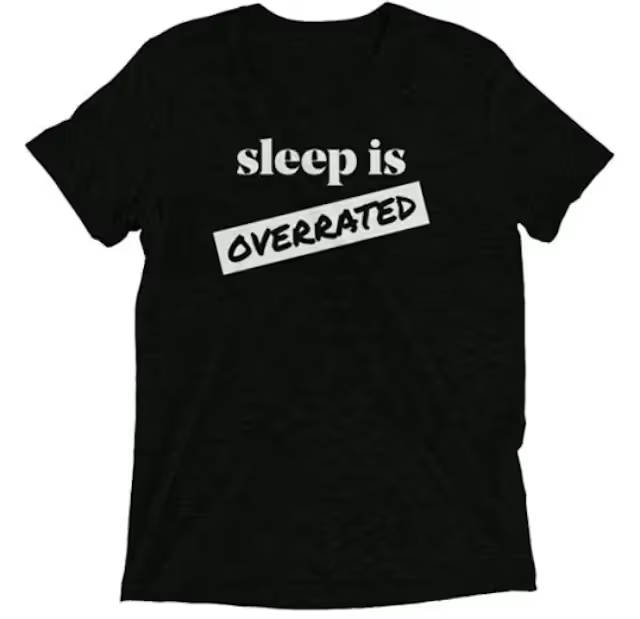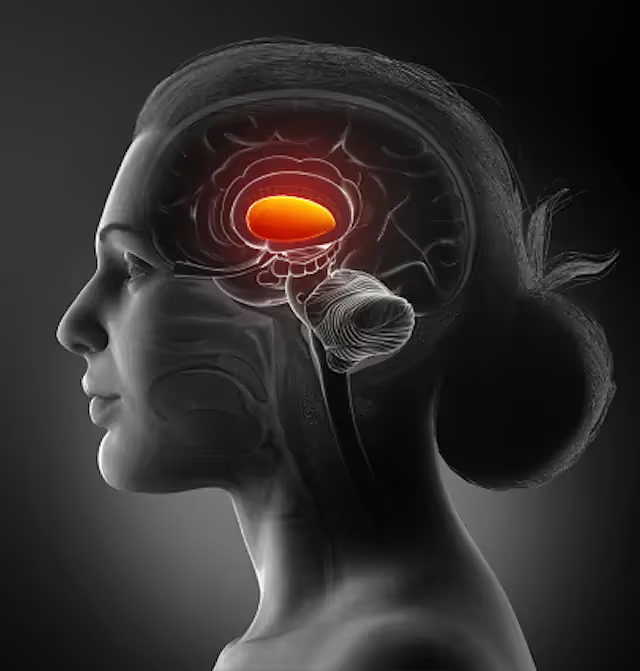
A simple way to burn fat and lose weight

Many people think that sleeping is a waste of their time. Whereas in a 24-hour economy, it's one of the most important things you can do to stay healthy.
“Sleep is overrated”. Above that, the white face of a girl in a trendy coffee shop. The kind of place where I had to pay far too many euros for the most drunk drink in the world. Where an ordinary coffee bean is seen as a rare truffle, found that morning by an Italian hunter in a top secret spot.
The flaky hair was in a ponytail above eyebrows like windshield wipers at work at wind force 10. Would she have hung out at a festival for too long? Or just finished a tough exam? As a mother, I would send her to bed right away. “Go to sleep, baby.” But she was serving coffee for 6 euro an hour, almost the price of my coffee delicieuse.

Many people think that sleeping is a waste of their time. While it's one of the most important things you can do to stay healthy. In the 24-hour economy where you can buy a toilet brush at night, maybe something to consider. Sleep is essential to rest and to keep your body and brain working properly. And to stay healthy. Chronic sleep deprivation disrupts your body systems and increases the risk of obesity.

Of course, nutrition is important, a healthy lifestyle, not too many calories and all the minerals a person needs. Move every day. One hundred million books have been written about that.
In this article, you'll discover the effects of sleep deprivation on your body weight. Because I'm from SMPL, simply without vowels, basic things to promote your health. In other words: fundamental!
Why sleep is so important when you want to lose weight
Short sleep is associated with hard work and manly. And pills would keep you going? What a mind-f*ck that is! Sleep is extremely important for all functions in your body, chronic sleep deprivation increases the risk of obesity. Chronic sleep deprivation leads to a serious disruption of various processes in your body.
Except that you'll look worse if you sleep less. And those effects can occur quickly. For a study by the Karolinska Institute in Stockholm, subjects who had slept just 8 hours before were photographed. And then photos were taken again after they had to stay awake for 31 hours. You understand that people who saw the photos rated the latter group as less attractive. This is an extreme example, but the message is clear: when we sleep poorly, facial health is visible.
Would I have dared say that to the girl at the coffee shop?

As a Western person, we sleep less and less. While good sleep is important if you want to burn fat.
Here are the differences when it comes to getting enough sleep:
- Less than 6 hours is not much
- 7 or 8 hours is good
- From 9 am you sleep for a long time
“The hours before noon count twice,” my mother said. And somewhere, that's true. The process of learning and memorizing takes place primarily in deep sleep at the beginning of the night. In the first hour and a half, you will have the deepest sleep. As the night progresses, the amount of deep sleep decreases. If you go to bed one or two hours late, you will skip the first periods of deep sleep...
My mom was right.
Your mom probably does, too.

Nap
With a nap, you try to make up for your sleep deprivation. At least, that's what you think. Indeed, researchers conclude that you cannot compensate for sleep deprivation with a nap. They just say how they see it: a nap isn't going to fix your sleepless night.
This is evident from research by the Sleep and Learning Lab from Michigan State University in the USA The researchers looked at cognitive deficits associated with sleep deprivation. “We found that short naps of 30 or 60 minutes showed no measurable effects,” says lead researcher Kimberly Fenn.
This is as follows. The deepest, most restorative phase of sleep is the slow-wave sleep (SWS) or slow wave sleep. In that phase, brain waves have a high amplitude and low frequency. Your body is then most relaxed, your muscles are loose and your heart rate and breathing are the slowest.
In this video you will learn more about the various sleep phases.
One 1 hour less sleep each night also makes you sick more quickly. Crazy that we never heard that in the entire Corona pandemic story... The chance that you will be very old is also less. I'm not saying it, but a team of scientists at Stockholm University.
Refuel over the weekend...
Or do you sometimes' sleep 'on' at the weekend? Not so healthy...
A study published in Current Biology states that people who work shorter nights during the week eat more in the evening and gain weight as often. Even though they then eat less after a longer night at the weekend, they go back to their old pattern after the weekend. The researchers even found evidence that insulin sensitivity decreases in people who sleep (too) too short during the week and catch up on the weekend. This means that your blood sugar levels rise, which can lead to type 2 diabetes over time.
This can be explained by the fact that the biological clock of long weekend sleepers is disrupted. Due to the alternation of short and long nights, these people experience a kind of jet lag, disrupting the rhythm and causing people to eat more during the week. That's why, according to researcher Ken Wright, it's best to “make consistent 7-hour nights.” “Stick to a fixed sleep program of approximately 7 hours. That means you may have to watch one hour less TV or spend less time on one of your mobile devices during the week, but that works best and is the healthiest,” says Wright in a video from the University of Colorado Boulder.
Early death, in other words: earlier death
A team of scientists from Stockholm University and Karolinska Institute did this for thirteen years. research among 38,000 residents in Sweden. This shows that adults who sleep five hours or less per night are significantly more likely to die prematurely than people who get around six to seven hours of sleep. According to the researchers, you can compensate for those lost hours: there would be no difference in health between those who sleep at least six hours each night and those who catch up on their sleep on the weekend. “In any case, a good night's sleep has an impact on longevity,” says lead researcher Torbjörn Åkerstedt.
Alzheimer
Not to mention all kinds of chronic illnesses that are the result of poor sleep. The suspicion that there is a connection between poor and too little sleep and Alzheimer's disease has been around for a long time, but scientists now seem to be able to confirm this as well.
From this new study, conducted by researchers at Washington University School of Medicine in St. Louis, have discovered that after just one night of poor sleep, your body produces more amyloid beta. Amyloid beta is a protein that may be linked to Alzheimer's disease.
'Tau', protein
After a week of poor sleep, the amount of 'tau' in the body also rises. Tau is also a protein linked to Alzheimer's. Head of the Research Team Dr. David Holtzman: “We've proven that poor sleep can be directly linked to higher levels of 2 proteins associated with Alzheimer's disease.” “We suspect that chronic poor sleep in middle age is more likely to develop Alzheimer's disease later in life,” he adds.
Read the full investigation report here.

Lose weight and burn fat
Chronic illnesses, earlier death. But what about losing weight and keeping a healthy weight by sleeping well? I'm going to tell you. While sleeping, you produce various hormones in your body that influence the feeling of hunger and fat burning.
The 2 hormones that play a major role in hunger are ghrelin and leptin.
Ghrelin, the hunger hormone
The first cause of weight gain due to sleep deprivation is the substance ghrelin. Ghrelin is a hormone that is produced by the stomach lining and makes you feel like you need to eat. It stimulates the appetite and causes the stomach to contract: you are dying with hunger. If you haven't slept well but your body is actually eating more of it. The result is easy to guess: you're hungry all day long!
And vice versa, you are less hungry if you have slept well.
Leptin, the “stop you-have-had enough hormone”
Leptin is the other substance that causes weight gain when sleep deprivation occurs. It's a hormone that tells the brain towards the end of the meal: Stop. You. Got. Enough. Had.
A lack of leptin means that you keep eating. Perhaps even worse: with a leptin deficiency, you're mainly in the mood for fat, protein, sweet and salty foods.
So junk food.
To produce the right amount of leptin, you need sufficient sleep time. Because lepten is only produced in fat tissue during sleep. If you sleep too little, the fat tissue simply has less time to produce leptin. The body is ingeniously made.
Cortisol, the stress hormone
The effect of that excess ghrelin is further enhanced by the production of cortisol, also known as the “stress hormone”. In difficult situations, it prepares your body to fight or flee. Cortisol therefore stimulates your brain even more to eat more. The result is that you feel extra hungry all day long, without burning those extra calories.
Growth hormone, the rejuvenation hormone
Cortisol production also has another disadvantage: it prevents the production of another hormone, growth hormone. Even though we've grown as adults, we can't live without growth hormone. It regulates our metabolism by extracting energy from fat, building muscle tissue and maintaining blood sugar levels. When you produce less growth hormone, you may gain weight or you may not be able to lose excess fat. Growth hormone boosts our metabolism, repairs tissue and cells, promotes bone density and influences the functioning of the cardiovascular system.
Growth hormone is produced in the brain
The good news is that everyone produces growth hormone. This happens in the pituitary gland, a gland in the brain. Although we produce growth hormone all our lives, the amount decreases as we age. Our lifestyle also plays an important role and we are responsible for that ourselves.
Insulin
Normally, your body produces insulin when your blood sugar is higher than average. With the help of that hormone, your fat cells can absorb excess sugars, and the extra energy is therefore stored as fat.
However, if you haven't slept enough, those fat cells are less sensitive to insulin. So they store less sugar. Instead, part of that excess ends up in your organs, with the result that you build up more of the extra unhealthy organ fat. This way, you will not only become fatter, but also unhealthier.
And then... your motivation goes down the toilet!
Long-term sleep deprivation also changes the way your brain works. This makes you less able to make healthy choices and resist unhealthy foods.
Can you muster the willpower to do stupid jobs after a bad night? Probably not — research shows that people with sleep deprivation often make significantly less wise choices.
There is a nice neurological explanation for that. Your insular cortex is one of the areas of the brain that is severely weakened by even one night of sleep deprivation.

Now that's exactly the region of the brain that normally gives you a counterbalance to the amygdala, a strong emotional part that likes to eat a lot and well.
In other words: you are less able to control eating impulses if you don't get enough sleep. In daily life, this quickly leads to concrete disadvantages.
That piece of chocolate disappeared in your mouth before you know it.

Increased insulin sensitivity
Lack of sleep is disastrous for your insulin sensitivity. It may even contribute to the development of insulin resistance. Insulin sensitivity refers to how sensitive the body's cells are in response to insulin.
Good insulin sensitivity ensures that our body's cells use blood glucose more effectively, so that blood sugar levels remain stable.
Poor insulin sensitivity can cause you to produce body fat more quickly. If you have become insulin resistant, you have poor insulin sensitivity. This is a harbinger of both weight gain as type 2 diabetes.
Less sleep, more food
Not convinced of a good night's sleep yet? In a small-scale study with 12 participantsthe effect of a good night's sleep on food intake was investigated. The participants who only got 4 hours of sleep per night ate an average of 22% more and saw their fat intake double compared to participants who slept 8 hours per night.
Nutrition and sleep and weight loss
When insulin levels in your body fall, growth hormone can do its job better. And then you can indeed lose weight while sleeping. And you will be better able to resist all kinds of temptations during the day, and your motivation will increase.

Grazing behavior, you're not a cow, are you?
Where to begin Your diet has an influence on your wake-sleep rhythm. Regular eating times support the biorhythm. Fixed eating times provide regularity to the biological clock, so that the metabolism remains in balance. Eating at different times with lots of snacks causes confusion, which is detrimental to your metabolism. You're not a cow roaming the pasture, are you? That's what my mom said. And I didn't like the comparison. But he was effective.
Take a look at your diet.
- Eat foods that keep your blood sugar levels from rising too much;
- Stop alcohol and caffeine. Especially in the evening.
- Stop smoking
- Use amino acids, including arginine, ornithine, and glutamine
- Ensure regularity
amino acids
SMPL72 not only contains 72 minerals you need, important for keeping all your body systems running. It also contains 18 amino acids, important for sleep, and 5 vitamins. Straight from nature.
Not tinkered in a lab.
We're not saying you're going to fall off it. But you do give your body what it needs every day.
Starting a fit (er) lifestyle?
You shop the SMPL here. Want to know more about what SMPL72 is and what it does? Then download our product guide.
And read the blog about how to detoxify your body every day and easily, quite important in a toxic world.















